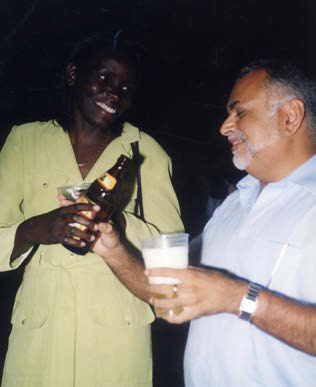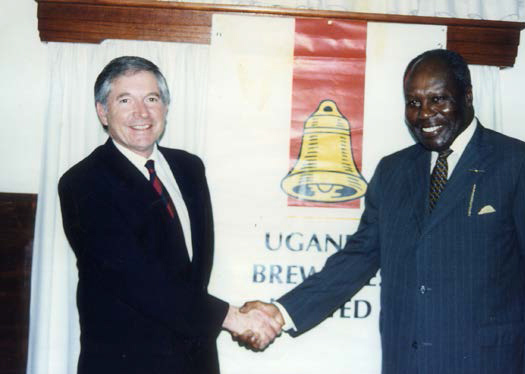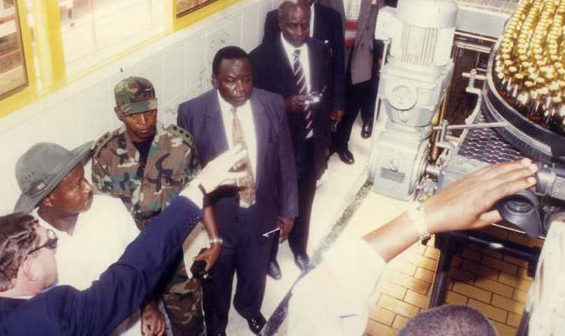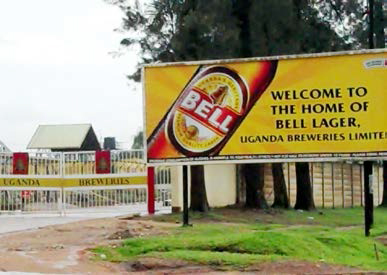Our History
Even through the period in which it was a staterun corporation, it remained a crucial entity. The history of the company provides insights into the challenges and the opportunities facing corporate Uganda. It is also a cautionary tale on why it is usually best for the private sector, and not government, to manage business corporations in developing economies.
Early history
Until the arrival of the British, distilled liquor was unknown in Uganda. When British explorers; John Speke and James Grant arrived at the court of Kabaka Mutesa I in 1862, among the many new products and ideas they sold to him was that of brewing of liquor.

In the 1880s and onward during the period of upheaval, Sudanese-born mercenary soldiers known as Nubians introduced liquor into the Ugandan territory. The local liquor was nicknamed “war gin” by the British who noted that the Nubians and other soldiers drank it before battle in order to raise their spirits. From “war gin” came a local mispronunciation “war-agi” or waragi as it is now known. As the Uganda Protectorate formed and the first elements of trade and business began to take root, traders noted that while the local banana and sorghum beer went bad after a short while, waragi by its distilled nature lasted much longer and so could be transported across villages and towns.
The establishment of Uganda Breweries
In 1922, the East African Breweries Limited (EABL) was founded in Kenya, a country with the largest British settler community in East Africa at the time. EABL afterwards began to moot the idea of industrially-produced beer being introduced onto the Ugandan market, thus the birth of Uganda Breweries Ltd. (UBL) Uganda Breweries itself was started in 1946, the year after the Second World War. On the face of it, it did not make any business sense.
However, before the company was launched, a detailed feasibility study had been conducted by EABL. A location was needed in Kampala that was close to an abundant and steady supply of water. That location was Luzira, near Port Bell. Tests were done at Makerere College (later Makerere University) of samples of the water at Luzira, its quality, alkaline content and the microbes in it.
Finally the company was formally started on July 27, 1946. The first Managing Director was a Dane and all the first directors of the new company were Europeans. The first drink produced by the new company came off the line in 1950 with a new, mild beer called “Bell Brand”. For the next six decades, Bell would become the flagship brand of UBL and for many, almost synonymous with the company itself.
In 1950, Macclesfield Brewery of Chesire in England acquired an interest in Uganda Breweries. Not only did this strengthen UBL’s capital base but also signaled that the Ugandan beer market was promising enough for a British brewer to make such an investment.
At the time, a new indigenous middle class was starting to form in Kampala, Entebbe, Mbarara and Jinja. Outspoken Ugandans such as Ignatius Musaazi, Augustine Kamya, Milton Obote and Abubakar Mayanja began to agitate for independence. The Madhvani family of Kakira near Jinja saw an opportunity in this growing Ugandan economy and in 1951 founded a brewing company in Njeru, Jinja called Nile Breweries. Uganda Breweries and Nile Breweries would soon become competitors. By this time, despite only being a relatively new company, UBL had started thinking beyond the Ugandan market. In 1954, it applied to be incorporated in Kenya. Just before Christmas that year, UBL was

The 1960s
Uganda attained internal self-rule in 1961 and independence in 1962. At that time, Uganda was a confident country. A bottle of beer cost one shilling.

Sir Michael Blundell, a British-born farmer and politician in Kenya, was named chairman of the board of East African Breweries Ltd in 1964 and in 1965 also became chairman of the board of UBL. Blundell although British felt strongly that the future of colonial Africa should be put in the hands of indigenous Africans. A young dentist called Dr. Martin Aliker was thus named a member of the board of directors of UBL on the recommendation of his mentor Michael Blundell.
Another Ugandan, Besweri Mulyanti, a county chief from Kaggo in Buganda, was also on the UBL board. Aliker was a medical doctor but had been interested in business since his university days at Makerere. He was also self-employed, a condition for one to join the UBL board. Aliker would go on in later years to become one of the largest Ugandan shareholders of the company and become a perennial personality on the boards of various companies through the years. In 1966, Dr. Aliker was appointed to the board of East African Breweries in Nairobi, to represent Uganda.
By 1967, Uganda Breweries was one of the largest companies in Uganda. It had a market capitalisation of £600,000 and had about 800 shareholders. However, just when the outlook was positive for Uganda Breweries and Uganda, a major political move was made that would affect the company for years to come.
In 1969, the government of President Milton Obote announced an emphatic change in political direction toward socialism when a pamphlet; “The Common Man’s Charter” was published. The Common Man’s Charter called attention to the idea that while African economies were growing the ordinary people often did not benefit from any of this growth.
The 1970s
On Labour Day, May 1, 1970, in what came to be termed as the “Nakivubo Declaration”, President Milton Obote announced that the government going to nationalise the economy.
As a result, large companies like UBL were targeted for what was effectively a government takeover.

It should be noted that although the government now had a 60% stake in the major companies, that percentage was only in the final profits. The day-to-day management of these companies was left in the hands of the managers who had been running these companies.
The partially nationalised companies however found a way to under declare their profits and ultimately the government did not gain as much of the profits as they had hoped.
Following the expulsion of the 40,000 non-citizen Asians in September 1972, scarcity of commodities such as salt, sugar and beer that had previously been in plenty on the market began to be felt. The same year, UBL embarked on an extension of 1.5 million Uganda shillings (about $200,000 at the official exchange rate of the time). With this extension, expected to be complete by the end of 1972, production at the plant was projected to increase from 110,000 cases of beer per month to 185,000.
Following the breakdown of relations between the Uganda government and the West and the steady trend toward strident nationalism, Hunter, a white Managing Director left Uganda for Nairobi in 1974 where he re-joined EABL. Juuko was then named Managing Director, becoming the first Ugandan to head UBL. Makai became the head brewer.
Two years later, Juuko left the company and was replaced by a Hajji Fadimula, a businessman and close associate of President Amin. Fadimula would remain in charge of the company until the fall in 1979 of the Amin government.
On May 5, 1976, Radio Uganda announced that the government was to take over a number of companies including Uganda Breweries. The government took full control of Uganda Breweries, running the company more or less like an extension of the civil service.
This was the most serious blow to the company since the 60% stake in business corporations first announced by the government in 1970. An unexpected increase in world coffee prices in 1977 brought Uganda its first budget surplus in years and with that a brief period of economic growth and increased disposable income for the population. There was a corresponding rise in the consumption of beer and other commodities.
However, this increase in national prosperity was reversed with the collapse in July 1977 of the East African Community. It thus became difficult for industrial machinery to be imported via Mombasa, affecting the beer industry as a result.
To worsen matters, on December 28, 1977, the government announced a freeze on the allocation of foreign exchange to businesses wishing to import manufacturing inputs and spare parts.
The collapse of the East African Community and the curb on foreign exchange allocations weakened the Ugandan beer market by the end of that year. The most serious damage to the Ugandan economy came with the 1979 UgandaTanzania war. In Kampala, Entebbe and Jinja widespread looting followed the fall of the Idi Amin government.
At this time in 1979 and 1980 following the fall of the Amin government, the Managing Director of Uganda Breweries was Daniel Kigozi. Kigozi had been an engineer with East African Breweries in Nairobi. Throughout the 1970s, East African Breweries never totally gave up its interest in Uganda Breweries despite the nationalisation of the company in 1970.
The 1980s
The Uganda People’s Congress (UPC) of Milton Obote returned to power in December 1980 and set about trying to revive the Ugandan economy. Economic policy took centre stage after 1981. The priority was the manufacturing sector.

Kigozi, who was a supporter of the Uganda Patriotic Movement party led by Yoweri Museveni in 1980, left the company and fled into exile. To encourage factories to invest in new equipment and increase production, the government in the 1981/1982 financial year announced a waiver on import taxes on inputs for the manufacturing sector.
The government’s budget proposals for 1981/1982 also lifted state controls of commodity prices. By the 1983/1984 fiscal year, industrial production had increased sufficiently to end the black market that had dogged the economy for the previous four years.
The government in 1984, after lobbying and protracted negotiations by East African Breweries, announced that it would return UBL to its original owners; East African Breweries and Ind Coope and City Breweries of the UK. Average daily output in the early to mid-1980s was about 1,500 crates per day.
A new government, the National Resistance Movement (NRM), came to power in January 1986 led by Yoweri Museveni. Much of the central and southern part of the country regained a measure of peace but the economy had been ravaged by years of war and erratic economic conditions. After 1986, as Museveni the head of state, Ibara left UBL and returned to the civil service. Daniel Kigozi who had returned from exile, was reappointed as Managing Director. The new president made revival of the Ugandan economy an early priority and one of the first companies he visited in 1986 was Uganda Breweries. The President wanted to get familiar with the way government corporations were run and what role they might play in revitalising the economy.
What surprised him the most was how the brewery had managed to stay afloat during all those years of economic decline and political upheaval.
After Kigozi was appointed Minister of Industry, he was replaced by a Kenyan, Ephraim Kubai, a former head of production at East African Breweries.
In 1987, Uganda Breweries was producing only about 2,000 crates per week. The company produced the Bell, Pilsner and Citizen brands. The Head Brewer was Anthony Makai while the late Frank Kyeyune was a Senior Brewer along with Nekemia Matembe. With demand far outstripping supply, the allocation of beer had to be delicately balanced and became a major part of management meetings. Many recipients of the beer, usually politicians and government officials however would sell it on the black market soon after receiving their quota.
In May 1987, Uganda Breweries faced a crisis arising from tensions between Uganda and Kenya. Relations between the new NRM government of Uganda and the Kenya Africa National Union (KANU) government of President Daniel Arap Moi had never been particularly close since Museveni took power. Wagons of Uganda Railways at Mombasa would be delayed for days and even weeks without explanation by the Kenya Ports Authority.
On May 19, 1987, over 1,300 tonnes of malt barley belonging to Uganda Breweries were held up in warehouses in Mombasa, causing a further shortage of beer in Uganda in what was already a market of severe shortages. The company at the time had a football team, Bell FC, that was managed by Charles Bakabulindi, the current Minister of State for Sports. Bakabulindi was an electrician at Uganda Breweries as well as head of the Uganda Breweries workers’ union. Frank Nyanzi was the head of marketing at the time.
During these difficult economic times, beer brands from Kenya like White Cap and Tusker were smuggled into Uganda across Lake Victoria. Kenya Breweries even built a small factory in the western town of Kisumu just to supply the Ugandan market.
In 1989, Uganda Breweries announced plans to expand its output to 4.2 million crates of beer per annum by the end of 1990. One of the most interesting episodes in the history of the company occurred in the early to mid-1980s.
The economic situation in Uganda was so dire in as far as the consumer market and operational conditions of companies were concerned that it forced the two brewing rivals, Uganda Breweries and the Jinja-based Nile Breweries, to put aside their differences.
At that time, Nile Breweries’ bottling machine was in a better working condition than Uganda Breweries’. The two companies signed a Memorandum of Understanding in which the beer produced by Uganda Breweries was driven to Jinja and bottled using the Nile Breweries facilities.
In a sense, the two companies had no choice but cooperate. Even if they tried to go it alone in the market, the demand was too weak to be of much profit to either company.
The 1990s
In June 1990, the NRM government announced the opening up of the foreign currency market to full, legal participation by the private sector. Forex bureaus started cropping up in Kampala. It was the first time since independence that foreign currencies had been freely traded.

This helped the Ugandan beer industry start its first full recovery from the 14 years of decline or struggle it had faced since 1976.
In 1990, the Irish brewer Guinness bought a stake in Kenya Breweries. That was when the fortunes of UBL began to really improve for the first time in 20 years. Kenya Breweries invested in new equipment for Uganda Breweries. A significant improvement in the quality of the beer produced and the quantity produced was achieved starting in 1990.
Uganda Breweries now enjoyed a market share in Uganda of over 90%. The company acquired East African Distilleries, a producer of liquor and other spirits, and took over the wellknown brand, Uganda Waragi.
However, by the end of 1992 the company was up for receivership. George Sutton was selected by Guinness in the UK to become Managing Director of Uganda Breweries in 1992. Sutton was asked by the board to turn the company around in six months or in the event of failure to do so, find a buyer.
Sutton negotiated the company out of receivership and started introducing modern management methods. The segmentation of the market was introduced, some brands for the mass, lower income market while others for the more up market consumer. For the first six months, nothing significant was noted of Uganda Breweries’ performance. But suddenly after six months, for no particular reason, everything started to fall into place. Sales shot up and the company’s finances turned from red to black.
Brands such as Bell Extra and Pilsner Red Top were launched. Advertising on radio, in particular, grew significantly and beer brands started to come to the attention of a much wider audience. It should be noted that during the 1970s, several corporations of the East African Community such as East African Airways and East African Railways owned shares in Uganda Breweries. When the East African Community collapsed in 1977, the shares of these East African Community entities fell sharply in value. Nobody was interested in them.
In a conversation, the Managing Director of East African Breweries in Nairobi Brian Hobson offered what he called “these useless shares” to board member Dr. Aliker. Having nothing to lose, Aliker bought up all the shares that were previously owned by the various East African corporations.
For 15 years, these shares were indeed useless. However in 1992 when UBL started its turn around and made its first solid profits, the shares blossomed into life. That is how Dr. Martin Aliker, partly by chance and partly by foresight, became the single largest shareholder in Uganda Breweries. In January 1995, UBL became the first Ugandan company to offer shares to the public when it signed an agreement with the Uganda Securities Brokers and Dealers Association (USBDA) to allow trading Over the Counter Stock Market (OTC). This historic offering by UBL two years before the Uganda Securities Exchange (USE) had come into existence could be said to have pioneered the listing by Ugandan companies on the stock market.
However, when the actual stock market, the USE, was launched in 1997 UBL did not list. The introduction of the Guinness brand in March 1995 saw an aggressive radio marketing drive and the stout quickly became a popular beer in the main towns of Uganda. Guinness sponsored the International Darts Open tournament in Kampala. It launched a Guinness bar promotion in Kampala and joint promotions with media companies, like the Guinness and Mr. Capital bar promotion with Capital Radio in 1996.
Rumours even began circulating that Guinness had medicinal powers that increased virility in men. About 18% of Uganda Breweries’ profits came from Guinness at the time.
Pilsner sponsored the popular concert at Namboole stadium in Kampala by the South African Reggae star Lucky Dube and another by the British Reggae band Aswad. Bell Lager was for many years a sponsor of the popular band, Afrigo. After Sutton left, he was succeeded by another Irishman, Seamus McGardle, as acting Managing Director. During the 1996/1997 fiscal year, Uganda Breweries increased its production by 14.8%. That year, there was increased automation at UBL and hence little reliance on human labour. Production became increasingly efficient. As production continued to be automated, the number of employees also reduced; to the present 296 as of 2016.
On April 1, 1998, the government lifted a long-standing ban on the importation of beer. This made it easier for companies like UBL to import brands from partner brewers like EABL that were in demand in Uganda.
In September 1998, UBL began to install eight large storage tanks each with a capacity of 15,300 cases of beer. It was part of the company’s Ush55 billion, five-year expansion plan. By 1999, UBL was producing 17,000 crates of beer daily at full capacity.
The 2000s
When the new millennium arrived in 2000, like many other companies UBL rode on the excitement of the period. It launched the Y2K Bell Lager rugby league. In-house, UBL emphasized training of its management and other employees. The new Managing Director at the time, David Lloyd introduced the mandatory use of email by employees. Lloyd also merged the management and union conferences and canteens into one. His reasoning was that in order to think and act as one company, it was best that UBL management and staff interacted in the same conference rooms and canteen.

In December 2010 a new German-made packaging line capable of handling 50,000 bottles was commissioned and doubled the plant’s output. Half-year results published by EABL for July to December 2011 indicated that the Ugandan part of EABL had the highest growth in beer consumption. Top-line revenue growth came in at 43%.
Bell, the venerable brand, saw a new look launched in 2011. For 61 years the beer had been packed in a Europeanstyle bottle. From then on, it would be packaged in a “long neck” bottle. In the same year, a new 100ml PET bottle for Uganda Waragi was introduced into the market with the strap line “The Spirit that Binds Us.” The new bottle saw sales increase by 17%.
In April 2014, Uganda Breweries started to focus more than ever before on the higher segment of the market. On average the higher-end brands, particularly the spirits, tended to yield a better profit margin than most of the beers. In June 2014, Smirnoff Ice Double Black was launched and its target market was the urban male consumer, while Senator Stout was launched in 2015 in 500ml and 300 ml bottles.
In January 2016, UBL in partnership with the Buganda kingdom announced it would produce a new beer called Ngule (or “crown” in Luganda). By June 2016, Ngule accounted for about 7% of the Ugandan beer market. The prospects for the company as it marked its 70th anniversary in 2016 looked promising. By 2016, Uganda Breweries was producing about 30,000 crates of beer per day, a far cry from the paltry 500 crates per day of 1987.

According to the annual report for 2015 by East African Breweries, “Bell Lager, the flagship of Uganda Breweries Limited (UBL) achieved better sales in F15 [the 2015 financial year] compared to the two previous years, maintaining its number [one] position in the mainstream beer products segment.”
The task facing UBL Management as the company starts its 71st year, is to grow the beer market, where volumes are key and yet margins on the low volume spirits are higher than their beer counterparts.
By late 2016, Uganda Breweries had made up for most of the losses in profit, operations, public image and standing in the market it experienced from 1972 until 1992.
UBL was formally started on July 27, 1946. The first Managing Director was a Dane and all the first directors of the new company were Europeans. The first drink produced by the new company came off the line in 1950 with a new, mild beer called “Bell Brand”. For the next six decades, Bell would become the flagship brand of UBL and for many, almost synonymous with the company itself.

